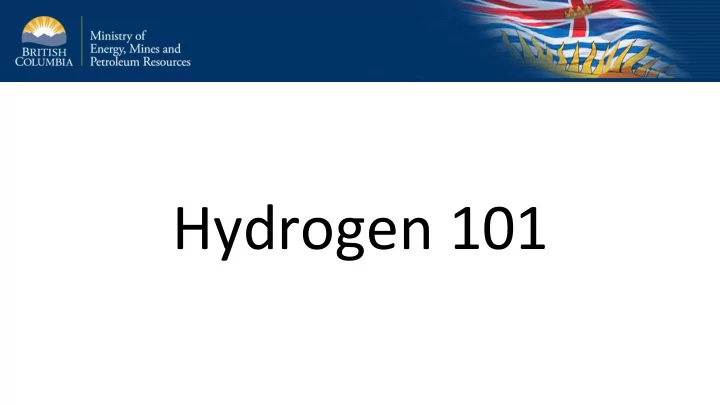

Hydrogen 101
Hydrogen Basics • Hydrogen (H 2 ) is the most common chemical element in the universe. It is rarely found in nature on its own – rather, it is bonded to Energy something else (e.g., water H 2 O). Density (MJ/ Fuel Type • H 2 is both a fuel and an energy carrier, easy to kg) store in large amounts, and can be produced Gasoline 46 from many different processes. Diesel 45 • If spilled, H 2 evaporates. It is non-toxic and emits no carbon emissions. Hydrogen 120 • It has the highest energy content of common fuels.
Ways to Produce Hydrogen H 2 can be produced via several processes. Two of the most common are: • Electrolysis: an electrical current is passed through water (H 2 O) to separate the hydrogen from the oxygen atoms. – The electricity used can be from grid electricity or from intermittent renewables • Steam Methane Reforming (SMR): high-temperature steam separates hydrogen from the carbon atoms in methane (CH 4 ). • Both production methods present made-in-B.C. solutions while reducing GHGs in the province Waste hydrogen from chemical plants (such as chlor-alkali) can be captured and used in other applications, such as transportation.
CleanBC Targets GHG reduction targets • – 40% by 2030, 60% by 2040, and 80% by 2050 15% renewable gas by 2030 target • (~30-50 PJs) – Significant potential for H 2 ZEV Mandate (light-duty vehicles) • – ZEV Act passed in May 2019 • 10% by 2025, 30% by 2030, 100% by 2040 Low Carbon Fuels • – Increase the LCFS to 20% by 2030
Alignment with CleanBC “Hydrogen can play a major role in B.C.’s low-carbon energy systems.” As part of CleanBC, the Province is accelerating development of BC’s hydrogen economy with: Injection of sustainable hydrogen into the natural gas grid to lower the • overall carbon intensity; Support for centralized hydrogen production; and • Financial supports for the deployment of fuel cell electric vehicles and • infrastructure. The Province will be developing a Hydrogen Roadmap to be released in 2020.
A Hydrogen Society While transportation is the most “talked about” application for hydrogen, it can be • used across the economy: – Natural gas: injection of hydrogen can lower the carbon intensity of the end- product resulting in fewer emissions • This would have downstream effects on emissions originating from industry and buildings that use natural gas for space and water heating – Renewable energy generation: the optimization of intermittent renewables, enabling them to be more reliable – Low carbon fuels: using renewable hydrogen in the refining process will lower the overall carbon intensity of conventional fuels, like gasoline, diesel and jet fuel – Regional development opportunities: remote and off-grid communities could be pioneers in using stationary power systems with fuel cells to decarbonize their isolated power grids
Hydrogen Around the World Japan : Committed to transition to a “Hydrogen Society” and introduced their Basic Hydrogen Strategy in 2018; and, China : In December 2016, China’s 13 th “Five-Year Plan” included a Fuel Cell Technology Roadmap and committed to building over 1,000 hydrogen refueling stations by 2030; South Korea : In January 2019, laid out a plan to develop the technology and infrastructure needed for a hydrogen-based economy; New Zealand : June 2019, released discussion paper on developing a hydrogen economy; United States : The State of California is taking a leading role and has allocated USD$92 million in funding to support an additional 40+ hydrogen refueling stations; Australia : In 2018, released their National Hydrogen Roadmap to provide a blueprint for the development of a hydrogen industry for export; France : June 2018, announced a Hydrogen Deployment Plan for Energy Transition; United Kingdom : Studying hydrogen as a means of displacing natural gas to decarbonize heat.
B.C. Hydrogen Roadmap • Hydrogen in B.C. Study was completed in June 2019 (can be found on the Ministry webpage) • Hydrogen can play a large role in decarbonizing provincial energy systems • B.C. Hydrogen Roadmap – expected 2020
Thank you! Kristen Littler Energy and Industry Decarbonization Branch Kristen.Littler@gov.bc.ca
Recommend
More recommend